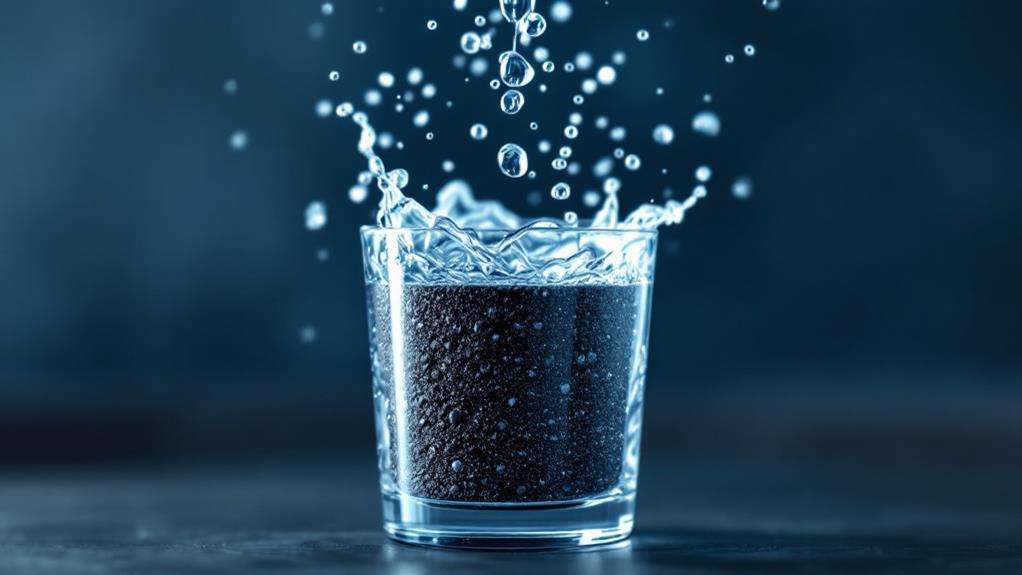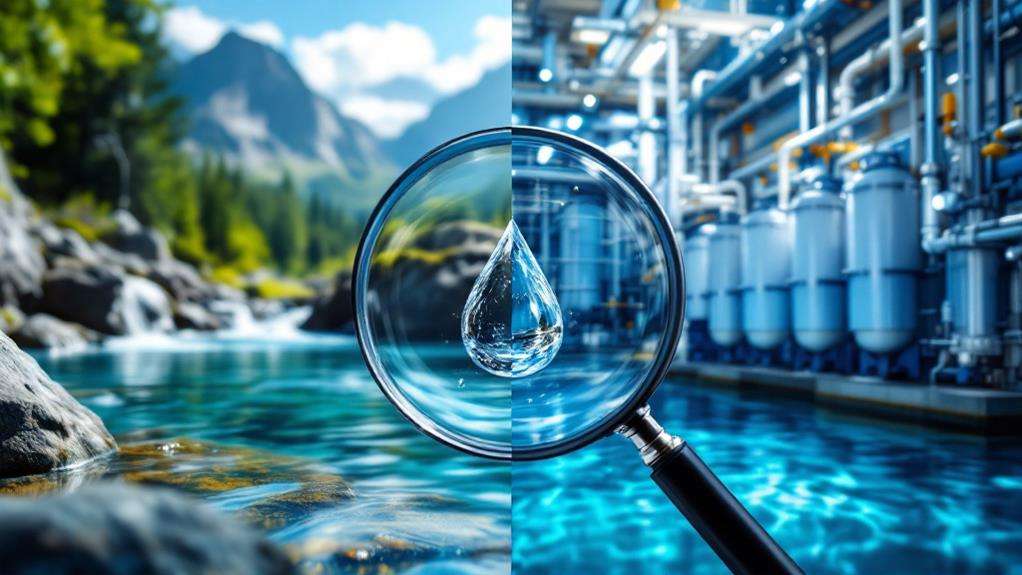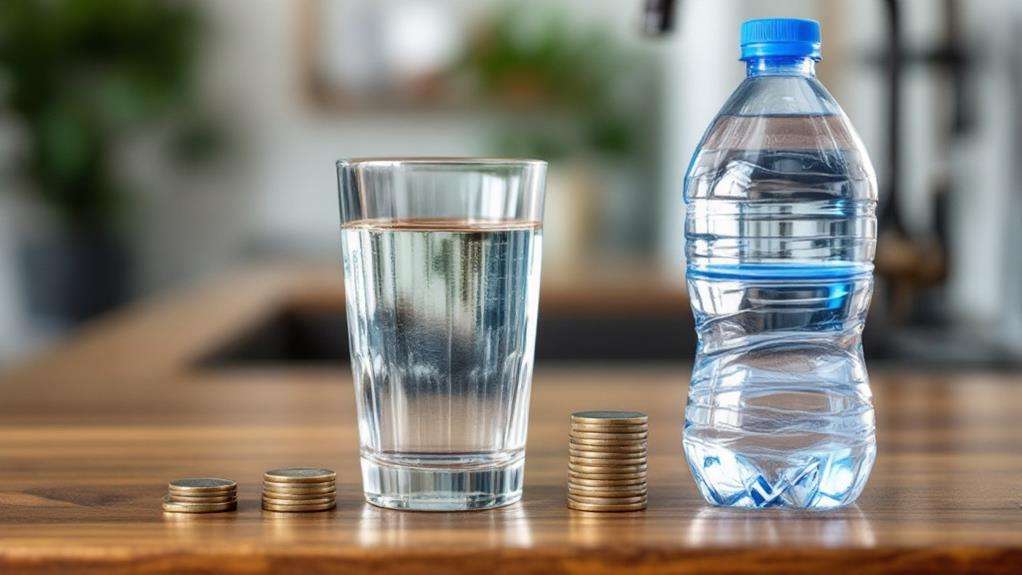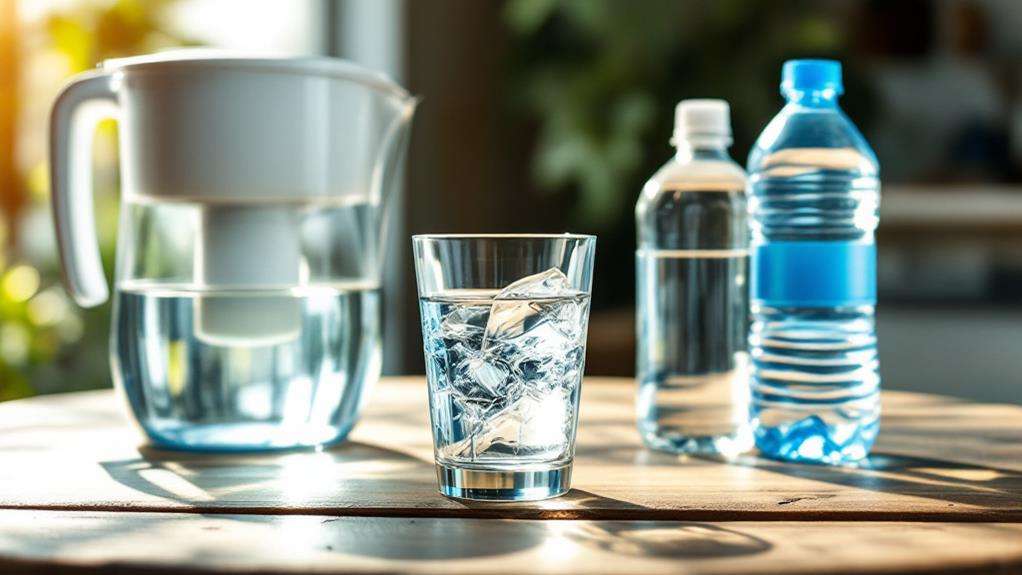Is Bottled Water Better Than Filtered Tap Water? The Facts
Filtered tap water is generally superior to bottled water in the context of quality, cost, and environmental impact. You'll find that tap water undergoes more rigorous testing and regulation than bottled water, which is often just treated municipal water. By using a home filtration system, you can remove contaminants and improve taste while saving money. Bottled water contributes to plastic waste and has a larger carbon footprint. It's also substantially more expensive, costing up to 2,000 times more than tap water. While bottled water may seem convenient, the facts show that filtered tap water is a smarter, more sustainable choice. Explore further to uncover the full story behind your drinking water options.
Types of Drinking Water
When it comes to drinking water, you've got several options to choose from. The main types of drinking water available are bottled water, tap water, and filtered tap water. Each has its own characteristics and potential benefits.
Bottled water is packaged in plastic or glass containers and comes from various sources, including springs, wells, or municipal water supplies. It's often marketed as pure and convenient, but it comes with environmental concerns due to plastic waste.
Tap water is what flows from your faucet, supplied by local water treatment facilities. It's regulated by government agencies and undergoes treatment processes to ascertain safety. However, the quality can vary depending on your location and the condition of your plumbing.
Filtered tap water is a combination of the two previous options. It starts as regular tap water but goes through an additional filtration process in your home. This can be done using various methods, such as activated carbon filters, reverse osmosis systems, or pitcher filters. Filtered tap water aims to remove contaminants and improve taste while maintaining the convenience and cost-effectiveness of tap water.
Understanding Filtered Water
Filtered water is a popular choice for those seeking to improve their tap water quality. When you use a water filtration system, you're actively removing or reducing various contaminants from your tap water. These systems employ different types of filters to achieve this goal.
The most common type of filter is activated carbon, which effectively removes chlorine, sediment, and organic compounds. It can improve the taste and odor of your water considerably. Other filters, such as reverse osmosis membranes, can remove dissolved solids, heavy metals, and even some microorganisms.
You'll find various water filtration options available, from simple pitcher filters to under-sink systems and whole-house filtration units. Each type offers different levels of filtration and convenience. When choosing a system, consider factors like your water quality, budget, and specific contaminants you want to target.
It's important to note that while filtered water can greatly improve your tap water's quality, it's not a guarantee of complete purity. Regular maintenance and filter replacement are indispensable to ensure your system continues to function effectively and provide you with clean, safe drinking water.
Benefits of Filtered Water

A glass of filtered water offers more than just refreshment. When you choose filtered tap water over bottled alternatives, you're making a smart decision for your health, wallet, and the environment. Filters can remove harmful contaminants like lead, copper, and mercury that may be lurking in your tap water, ensuring you're drinking cleaner, safer water. Additionally, activated carbon filters, such as those used in Brita pitchers, can improve the taste of your water by reducing impurities like chlorine and zinc.
Opting for filtered water can lead to significant savings, potentially up to $240 per year compared to buying bottled water. This affordability, combined with the convenience of having filtered water readily available at home, makes it an attractive choice for budget-conscious consumers. Likewise, by filtering your tap water, you're actively reducing plastic waste. You could prevent up to 1,800 water bottles from ending up in landfills or oceans each year. This environmentally-friendly approach aligns with sustainable living practices and helps reduce your carbon footprint. In a similar way, filtered water provides a cost-effective, convenient, and eco-friendly alternative to bottled water while ensuring you're drinking clean, great-tasting water.
Bottled Water Sources
The truth behind bottled water sources may surprise you. While you might assume that all bottled water comes from pristine springs, the reality is far more complex. Bottled water sources can vary widely, including springs, artesian wells, municipal water supplies, and even processed tap water.
Many bottled water companies use municipal water supplies as their source, often treating it with Reverse Osmosis or other methods before bottling. The Food and Drug Administration regulates bottled water, but their standards are less stringent than those for public tap water. This discrepancy allows some companies to sell what is fundamentally repackaged tap water at a premium.
You should be aware that bottled water labels can be misleading. Companies may use marketing tactics to imply purity or natural origins when the product is simply processed tap water. According to Beverage Marketing reports, a significant portion of bottled water sold in the U.S. comes from municipal sources.
To further complicate matters, some bottlers avoid federal oversight by bottling and selling water within the same state. This practice limits your access to information about the true source and treatment process of the water you're purchasing.
Regulation and Safety

When it comes to regulation and safety, you might assume bottled water is held to higher standards than tap water. However, this isn't necessarily true. The EPA oversees tap water quality, while the FDA regulates bottled water. Surprisingly, bottled water isn't required to be safer than tap water.
Tap water must undergo more rigorous treatment and testing processes than bottled water. It's disinfected, filtered, and tested more frequently. Bottled water has similar chemical pollution limits but a less strict lead limit. It is crucial to consider the following:
- One in five states don't regulate water packaged and sold within their borders
- 25% or more of bottled water is simply treated tap water
- 22% of bottled water brands tested contained chemicals above state health limits
Safety standards for tap water are generally more stringent than those for bottled water. While tap water may face issues in rural areas due to pesticide runoff or private wells, most concerns can be resolved through annual water quality reports and home filtration systems. It's important to emphasize that regulations don't guarantee absolute safety for either bottled or tap water, but they do provide a structure for ensuring water quality.
Environmental Impact
Considering the environmental impact, bottled water's convenience comes at a significant ecological cost. The production and disposal of plastic bottles contribute to millions of tons of plastic waste annually. This waste often ends up in landfills or oceans, harming wildlife and ecosystems.
Manufacturing plastic bottles requires substantial energy and resources, leading to increased carbon dioxide emissions. The transportation of bottled water across long distances further adds to its carbon footprint. In contrast, tap water relies on existing infrastructure, minimizing additional environmental strain.
The Environmental Protection Agency (EPA) reports that plastic bottles can leach toxic chemicals into the water, especially when exposed to heat or sunlight. These chemicals not only pose potential health risks but also contaminate soil and water sources when bottles are improperly disposed of.
Cost Comparison

Despite the widespread popularity of bottled water, it's considerably more expensive than filtered tap water. When you compare the costs, you'll find that bottled water is a staggering 2,000 times pricier than tap water. This price difference becomes even more significant when you take into account that Americans consumed 15 billion gallons of bottled water in 2020 alone.
To provide context, here are three key points to reflect on:
- Tap water costs about $0.002 per gallon, while bottled water is around $1 per liter.
- Water filters offer a cost-effective alternative to plastic water bottles.
- The money spent on bottled water could be better employed elsewhere.
Quality Assessment
Regarding quality, both bottled water and filtered tap water generally meet safety standards. The Environmental Protection Agency (EPA) regulates tap water, while the Food and Drug Administration oversees bottled water. Both agencies enforce strict guidelines to guarantee you're drinking quality water.
Filtered tap water often surpasses bottled water in terms of purity. Most home filtration systems remove contaminants like chlorine, lead, and coliform bacteria, which can sometimes slip through bottling processes. You'll find that filtered water tastes fresher and is often safer than its bottled counterpart.
However, bottled water may be preferable in certain situations. If you're traveling or live in an area with compromised water sources, bottled water can be a reliable option. Some bottled waters also offer added minerals or electrolytes, which you might find beneficial.
It's important to note that not all bottled water is created equal. Some brands simply bottle municipal tap water without additional treatment. To guarantee you're getting quality water, research the source and treatment methods of your preferred bottled water brands or invest in a reliable home filtration system.
Making an Informed Choice

When it comes to choosing between bottled water and filtered tap water, you'll need to weigh several factors. Consider the following key points:
- Quality and safety
- Environmental impact
- Cost-effectiveness
While bottled water might seem convenient, it's not always safer than tap water. The Environmental Protection Agency (EPA) regulates public water systems, ensuring tap water meets strict safety standards. Home filters remove additional contaminants, often providing water that's just as safe, if not safer, than bottled alternatives.
Don't forget to factor in the environmental impact of your choice. Plastic bottles contribute considerably to waste and pollution, making filtered tap water a more sustainable option. The water-intensive production process of bottled water also raises concerns about resource depletion.
To make an informed decision, assess your local tap water quality by reviewing reports from your water utility. Compare this with the quality of bottled water brands you're considering. Remember, not all types of water are created equal, and careful label checking is essential.
Ultimately, by evaluating water quality, environmental impact, and cost, you'll be able to choose the best option for your needs and values.
